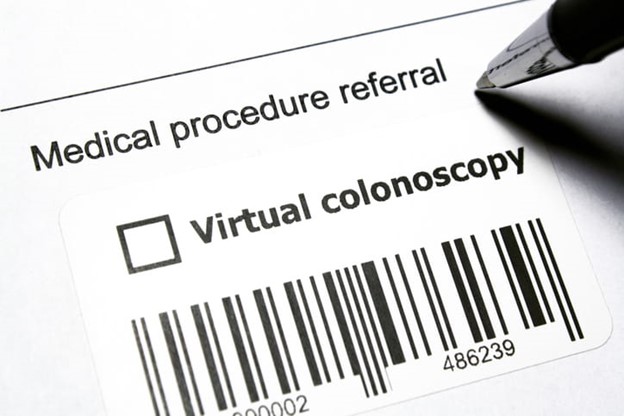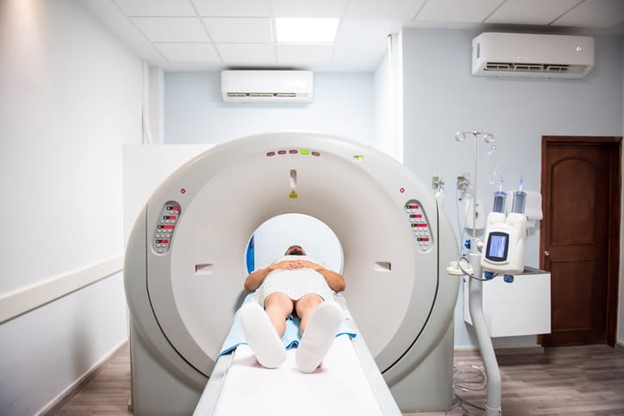
Colon cancer is one of the most common forms of cancer worldwide, and early detection is crucial for effective treatment. Two screening methods commonly used to identify abnormalities in the colon are virtual colonoscopy — also known as CT colonography — and regular colonoscopy.
Schedule Your CT Scan Today
What is a Virtual Colonoscopy?
A virtual colonoscopy is a non-invasive, preventative medical scan imaging technique that uses computed tomography (CT) scans to create three-dimensional images of the inside of the colon. It involves taking multiple X-ray pictures of the abdomen and then using computer software to reconstruct these images into detailed visualizations of the colon’s structure.
This procedure allows doctors to examine the entire length of the colon for abnormalities such as polyps or tumors, which may be associated with colon cancer, without inserting a scope into the rectum and advancing it through the colon, as done in a regular colonoscopy.
Is a Virtual Colonoscopy as Good as a Regular One?
When used as part of preventative health care, a virtual colonoscopy can be beneficial for the early detection of issues within the colon. A virtual colonoscopy provides highly detailed 3D images of the entire colon using computed tomography (CT) scans. It effectively detects large polyps or tumors with high accuracy rates similar to regular colonoscopies.
What Are the Advantages of a Virtual Colonoscopy?
Virtual colonoscopies are a rapidly advancing and increasingly popular alternative to regular colonoscopies. Like any medical procedure, it has advantages and some limitations compared to the traditional method.
One advantage of virtual colonoscopy is that it is less invasive and does not require sedation or the insertion of a scope into the rectum. This makes it more comfortable for patients and eliminates potential risks associated with anesthesia or complications from the scope insertion.
Moreover, virtual colonoscopy produces highly detailed images of the entire colon, allowing doctors to detect polyps or tumors accurately. It can identify large polyps with high accuracy rates similar to those achieved by regular colonoscopies.
However, there are some limitations associated with virtual colonoscopy. If abnormalities are detected during the scan, a follow-up diagnostic evaluation might be required using a regular colonoscopy for confirmation and treatment.
How Painful is a Virtual Colonoscopy?
A virtual colonoscopy is considered much less painful and uncomfortable than a regular one. In a virtual colonoscopy, there is no need for sedation or the insertion of a scope into the rectum, which can significantly reduce patient discomfort.
During the procedure, you will lie on your back, and your abdomen will be gently inflated with carbon dioxide gas. This might cause some mild bloating or discomfort similar to experiencing gas cramps. However, it typically resolves quickly after the procedure is completed.
While there may be minimal discomfort during certain moments of a virtual colonoscopy, it is important to note that it is generally well-tolerated by most individuals and does not involve significant pain.
Is a Virtual Colonoscopy Fast?
If you’re searching for a ‘virtual colonoscopy near me’ that is relatively fast, call Preventative Diagnostic Center to schedule yours today.
The procedure itself typically takes a few minutes to complete. Since it does not involve sedation or the insertion of a scope into the rectum, there is no need for recovery time afterward.
While the actual procedure may take less time than a regular colonoscopy, preparing for a virtual colonoscopy can require bowel preparation, similar to a traditional colonoscopy. This often involves emptying and cleansing your bowels by following specific instructions prescribed by your healthcare provider.
What are the Similarities and Differences Between the Two?
Virtual and regular colonoscopies are screening methods used to detect abnormalities in the colon, such as polyps or tumors.
Similarities:
- Screening purpose: Both procedures aim to identify potential signs of colorectal cancer or precancerous growths
- Bowel preparation: Before both types of procedures, patients need to undergo bowel preparation to cleanse the colon before examination
- Detection capabilities: Both virtual colonoscopy and regular colonoscopy can effectively detect large polyps or tumors
Differences:
- Invasiveness: Virtual colonoscopy is minimally invasive, while a regular colonoscopy is an invasive procedure that involves inserting a flexible tube with a camera into the rectum and advancing it through the entire length of the colon
- Sedation requirement: Regular colonoscopies typically require sedation to ensure patient comfort during the procedure. On the other hand, virtual colonoscopies do not require sedation.
- Procedure time: Virtual colonoscopies are faster than regular ones since no scope insertion is involved
- Polyp removal ability: One major difference is that during a regular colonoscopy, if polyps or abnormal tissue are detected, they can be immediately removed or biopsied for further analysis. In contrast, virtual colonoscopy primarily focuses on imaging and identifying abnormalities but does not allow simultaneous removal or biopsy.
- Smaller polyps detection: Regular colonoscopies have traditionally been considered more accurate in detecting smaller polyps and subtle abnormalities due to the direct visualization provided by the scope. Virtual colonoscopies may have slightly lower sensitivity in this regard.
- Risk of perforation: Although rare, there is a small risk of colon perforation with regular colonoscopies. Virtual colonoscopies do not carry this risk since no scope insertion occurs.
Get a Virtual Colonoscopy in Las Vegas Today
When searching for a ‘preventative medical scan near me’ and you want a non-invasive and efficient way to screen for colon abnormalities, a virtual colonoscopy at Preventative Diagnostic Center in Las Vegas is the perfect solution. Discover the latest, high-resolution CT imaging technology without the discomfort of traditional scope insertion or sedation. Regular colon screens are essential to ensure early detection. Don’t wait; take charge of your health and peace of mind.
Book Your CT Scan Today
Sources:
American Cancer Society Guideline for Colorectal Cancer Screening. (2020).
Key Statistics for Colorectal Cancer. (2023).
Virtual Colonoscopy. (2021).

